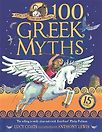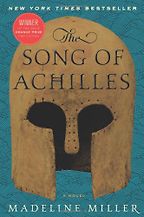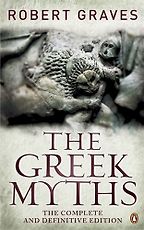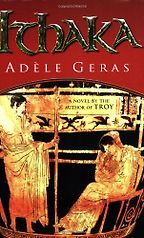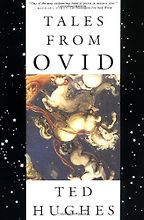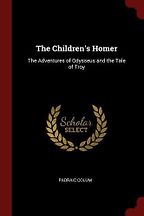What is a Greek myth? What is it about Greek mythology that has attracted us down the ages?
A Greek myth is basically a way of explaining the world, or it was a way of explaining the world to a primitive people who didn’t have any explanation of the sun or the moon or the disasters that happened — like earthquakes and floods and fire. It was easy to make a myth about it, and to say that it was down to the gods. What’s so fascinating about the Greek myths in particular is that the gods are terribly human. They’re in Olympus but they’re recognizable to us. They have a lot of quirks and foibles and they do all the things that humans do: Zeus cheats and lies and he is the most appalling serial adulterer. The stories also, perhaps, help explain how to behave and the consequences of certain actions — a bit like the Ten Commandments, “Thou shalt not…” or something terrible will happen. So, for instance, Ixion, who commits the first murder, ends up in a fiery pit, tied to a wheel, forever revolving, because that was not a good thing to do. They’re a guide to life as well as being stories.
How did you, personally, get interested in them?
I read two particular books, which I haven’t chosen because I think for modern readers they’re a bit too bowdlerised and preachy. One was The Heroes by Charles Kingsley and the other was A Wonder Book/Tanglewood Tales by Nathaniel Hawthorne, of Scarlet Letter fame. These two authors were telling the stories in completely different ways and taking different aspects of them. That was one reason they fascinated me, but they’re just damn good stories: it’s as simple as that.
You don’t think it hinders the narrative that the gods can always decide the outcome?
No, I don’t think it does affect the story, because, as I said, the gods do have all these human traits. They make mistakes, they show themselves not to be completely infallible. I think that’s part of the attraction.
Let’s go through the books you’ve chosen. I noticed that three of the five are about or related to the Trojan War…
Yes. In my opinion the Iliad and the Odyssey are two of the greatest tales ever told. Although the gods are involved, the stories are very much about humans and how humans react to certain situations. They’ve always fascinated me. I went to Troy when I was in my twenties and was completely blown away by the fact that it’s tiny. Going there helped me understand this extraordinary story about Achilles and Hector fighting their way around the walls of Troy seven times. You think a city is huge, but it wasn’t. Two fit young men, even dressed in armour, could quite well have run around the walls seven times, hacking at each other.
How much is left of Troy?
Not a great deal. Of course there’s always the question of “Well, was this the right Troy?” One thing I couldn’t understand when I went there is that you have to drive miles and miles and miles inland to get to it. Then I realized that the whole of the plain was originally sea but has silted up and is now land. For me the whole geographical thing was a fascination.
Let’s talk about the first book you’ve chosen, which is about the greatest Greek hero at Troy, Achilles, and his love affair with another Greek man, Patroclus. It’s called The Song of Achilles…
Yes, this is by Madeline Miller who is an American academic. It was her debut novel and it won the Orange Prize. For some reason I came across it when it first came out, before anyone else knew about it, and I absolutely loved it. I really appreciated the deft, spare beauty of the writing and I like the way it came at the story from Patroclus’s point of view.
Tell me about the story.
At the beginning Patroclus is the underdog. Then he makes friends with Achilles, this golden, god-like boy and they go off to the centaur Chiron and are educated by him. Then, of course, they go to the Trojan War. The book might shock people because there’s some quite graphic sex scenes in it. One of the reasons I loved it is that I’ve always thought of Achilles as a slightly spoiled brat but told through the eyes of Patroclus I understood him much better. I just loved the richness of the language, the descriptions. She really made me feel I was in ancient Greece — the smells, the whole environment. And, again, it’s just such a good story. I knew how it ended, of course. It’s like Othello, you always know how it’s going to end, but I still always hope that it’s going to end differently. I hope against hope that somehow it’s going to have a happy ending. Then of course it doesn’t and it’s almost a double blow…
I thought the relationship she depicted between Achilles and Patroclus was very beautiful. I was so sad at the end, I almost cried.
Oh I did cry. That whole tenderness of male friendship and love, it was very moving.
You mentioned in your email you thought it was one of the best retellings of the story you’d read in years. Was it also a very accurate retelling? The author teaches Greek and Latin, so I expect there was a lot of attention…
To source material, absolutely. She clearly knows her Homer and associated sources. She researched and researched and researched in order to get all the details right. One of the things about writing a semi-historical book like that is that for ancient stuff there really isn’t all that much you can go back to. You just have to do your best. Everything she has in there is pretty authentic — or as authentic as it possibly can be.
Let’s go on to your next choice, Robert Graves’s The Greek Myths: The Complete and Definitive Edition. Every single Greek myth is in this book, is that right?
As far as I know, every single myth and every single variation, every single little nugget of Greek myth that isn’t necessarily even complete, is in there. This is my Greek myth bible. Robert Graves was the most amazing ancient history scholar and a marvellous writer as well. One of my great sadnesses is that I don’t actually read ancient Greek, I was never taught at school and I’ve never learnt. So I’ve always had to rely on translations and, for me, he’s the best.
In the book is he just translating ancient texts or is he telling the stories himself?
He’s read them in the original and then he tells them himself. So they are his tellings, but they’re not meant to be flowery or literary. They cram in absolutely everything. He has the most massive footnotes as well and references to where he found the actual myths: usually Hyginus or Diodorus Siculus or somebody that before I read Graves I’d never even heard of. In fact I now have my own copies of Apollodorus and Diodorus Siculus and Hyginus. The footnotes are just amazing. I learned so many different nuggets there, it’s almost worth reading just for them.
Is it very readable?
If you want to know all the Greek myths then definitely read it. You can’t say you really know about Greek myths until you have read it. But I wouldn’t say sit down and think you’re going to do it all in one go. Take it in chunks.
I absolutely loved Robert Graves’s historical novels, I, Claudius and Claudius the God. But I saw an interview with him and he said he just wrote them quickly to make a bit of money, they weren’t part of what he considered his serious work…
No, absolutely not. He was writing things like The White Goddess and studying The Golden Bough and all those things. He was just steeped in the whole thing.
The third book you’ve chosen is Ithaka, by Adele Geras, which is aimed at young adults.
Yes, as I am a children’s writer, I thought it was nice to put something in of that nature. Adele is one of my favourite writers for children and teenagers. Ithaka is part of a loose trilogy based on the Odyssey, the Iliad and the Aeneid. She wrote one book called Troy, then there’s Ithaka and there’s Dido as well. That goes into the Aeneid: it’s about Dido and Aeneas, about the Trojan side, the ones who escaped.
So Ithaka is written from the point of view Penelope, who is waiting for her husband, Odysseus, to come back from the Trojan War?
Yes, she’s waiting and waiting and waiting and having to fend off all those damned suitors with one excuse or another. Some of them are rather importunate and absolutely wanting her to make up her mind and there’s the whole politics of the situation. I just like the fact it was told from the woman’s point of view. I think if you wanted to get a teenager into the whole Greek myth thing again — having done it at school earlier — perhaps this book would be a good way in.
Let’s go on to the Tales from Ovid: 24 Passages from the Metamorphoses by English poet Ted Hughes.
The Metamorphoses are wonderful transformation myths about the gods.
What is a transformation myth?
Quite a lot of them are about the gods or allied creatures chasing after some nymph or other, and the nymph praying for release from this ghastly thing that is about to happen to her, and being changed into a tree or a reed or an animal, so that she can’t be got at. So you’ve got poor old Daphne, for instance, who is a lovely nymph and she didn’t wish to lose her virginity, so she prayed to the god of the river and became a laurel tree — which is why the Greek name for a laurel tree is daphne.
And these were then adapted and told by the Roman writer Ovid?
Yes, he took some of the key Greek myths and made them into these wonderful stories. I don’t know where he got them from, perhaps he got them himself from Greece, because a lot of the Romans had Greek slaves or Greek tutors. I don’t know when he first heard them. Anyway, he’s taken the stories and made them into this wonderful collection. I’ve got lots and lots of different copies of the Metamorphoses, I think they’re essential. I could have chosen a straight translation. But I love Hughes’s poetic voice, and the way he uses language.
Did Hughes translate Ovid’s stories himself?
Yes, I’m pretty sure he translated them himself. It’s not all of Ovid’s Metamorphoses, it’s just 24 of them. Hughes’s voice and his poetic ear are just so wonderful. I remember reading the whole lot of them out loud to myself and thinking “Wow! This is how they were meant to be heard!” You wouldn’t have had a printed book, in the days when it was written. Ovid would have read them out loud to people, and that is how they would have heard them, he would have performed them.
Your last book is a children’s book about Troy again — The Children’s Homer, a retelling of the The Iliad and The Odyssey by Padraic Colum.
This was the most precious book I owned as a child, and it was my way into the Odyssey and the Iliad at a very early age. I’ve got the copy in my hand now – it was given to my father in April 1921 and he passed it on to me. It is quite old-fashioned in tone but it’s not preachy and the language is amazing. Like Ted Hughes, Padraic Colum was a poet. I think for me, the thing that links all these books, apart from the actual stories, is the way that language is used within them. In this one too, the way he uses language is wonderful. The illustrations too. They’re black-and-white, very art deco, very spare. It’s still how I imagine all those heroes, gods and goddesses to look.
I just read it and thought it was quite a nice way of getting the stories of both the Iliad and the Odyssey into my head. I read the other books you recommended afterwards and it all made sense because I already knew the basic outlines from this children’s book.
Yes, I think as an adult you can still read it and get pleasure from it.
The thing about Greek myths and Homer is that there are so many references to them in daily life, but it wasn’t until I read these books that I felt confident that I was a bit more on top of who everyone was.
Yes, because it’s quite complicated isn’t it — who is related to who? The gods, for instance, are always either married to their sister or their daughter. I had to skate over that quite a lot in Atticus. You’re right about the Greek myths coming into our everyday lives. Everybody wears Nike shoes, she was the Greek goddess of victory. Did you ever read Ambrosia creamed rice? That’s the food of the gods. Advertisers are using Greek myth references all the time, and people don’t even think about it. Then there’s your Achilles heel, your Achilles tendon.
Speaking of which, I was intrigued that that story –- about Achilles being dipped in the River Styx by his mother — didn’t appear in either The Children’s Homer or The Song of Achilles. Then I read Miller’s notes about it, and she said that it was a later myth, so she hadn’t included it.
I know. There are several different versions of that particular story. I chose to include it when I wrote about it. I quite liked it.
Yes, and I should mention for anyone who has small children, that your book, Atticus the Storyteller’s 100 Greek Myths, is absolutely wonderful. My own are 6, 5 and 4 and they can’t get enough of it. I now give it as a present whenever any of their friends has a birthday.
That’s wonderful. The thing is that if they have them in their heads now, it will actually serve them for life. There are meant to be only x number of stories in the world, and these are pretty much templates for all of them…
Do you have a favourite Greek myth?
Everybody always asks me this. Yes I do, but it’s quite a strange one. I like the story of Nyx, and the fates. Nyx was the goddess of the night and her cloak covered the night sky. She had three daughters who were the fates. I love the story of the fates: Klotho, Atropos, and Lakhesis, who weave the tapestry of life. They’re the ones who decide what your fate is going to be, so they snip the thread if you’re going to die. I just love the mystery of it.
——————————————————
Also recommended on Five Books as an entertaining retelling of the Greek myths (especially as an audiobook) is Mythos by Stephen Fry:
Interview by Sophie Roell, Editor
August 15, 2013. Updated: November 4, 2024
Five Books aims to keep its book recommendations and interviews up to date. If you are the interviewee and would like to update your choice of books (or even just what you say about them) please email us at [email protected]
Five Books interviews are expensive to produce. If you've enjoyed this interview, please support us by donating a small amount.

